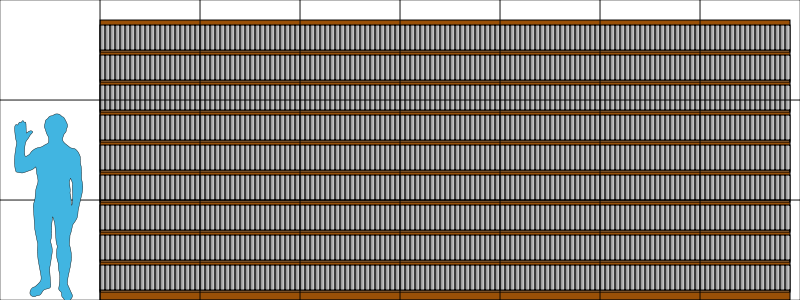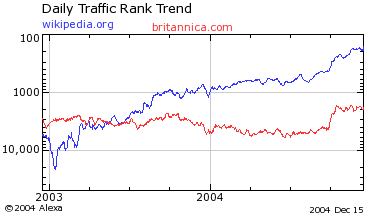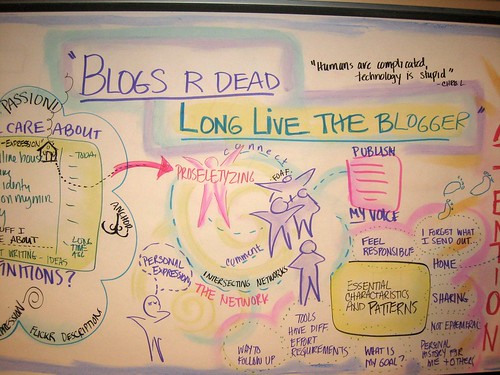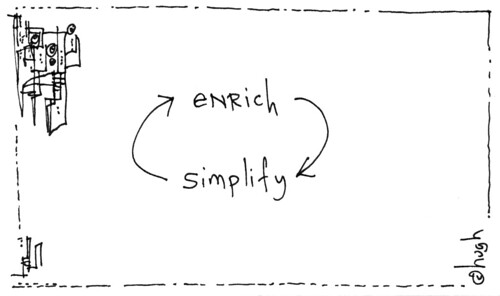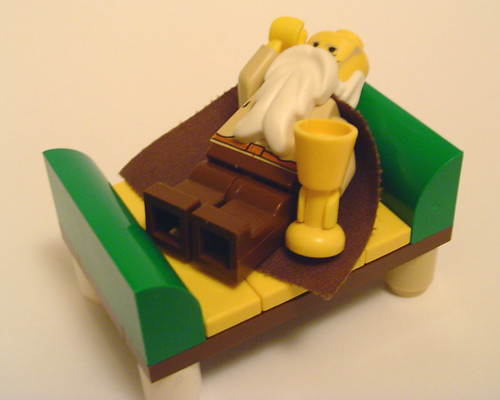CaseForOpenContent
Participation
There's this photo of Barack Obama taken by the Associated Press last year when he visited Berlin:
What is notable about this photo?
And how is it like:
"In the days before machinery men and women who wanted to amuse themselves were compelled, in their humble way, to be artists. Now they sit still and permit professionals to entertain them by the aid of machinery. It is difficult to believe that general artistic culture can flourish in this atmosphere of passivity." - Aldous Huxley, 1927
Yet can the word "passivity" be used to accurately describe modern web culture?
(Via http://thru-you.com/)
"...we will routinely prefer a shareable amateur source to a professional source that requires us to keep the content a secret on pain of lawsuit. (Wikipedia's historical advantage over Britannica in one sentence.)" -- Clay Shirky
The case for open education could be summed up as "what works on the web"...
Using volumes 25cm high and 5cm thick (some 400 pages), each page having two columns, each columns having 80 rows, and each row having 50 characters, ≈ 6MB per volume. As English Wikipedia has around 7.5GB of text (August 2007, length of wikitext counted by myself) ≈ 1250 volumes. Note that this is a conservative estimate, as it doesn't include images, tables etc. which take up more surface than the text which describes them.
UBC case study: Adventures in Wikipedia
- Murder, Madness, and Mayhem Project Page - the work of UBC Professor Jon Beasley-Murray, (Wikipedia Page, Blog)
- Article: El Señor Presidente
- The FA Team
Why does this work appeal so much?
- fast, cheap, and out of control...
- augments traditional literacy with new media literacy
- results in genuinely useful public knowledge resources (perhaps the essence of open education resources)
- students will respond to tasks that are authentic
Publishing gets personal
Brian just loves his blog: http://blogs.ubc.ca/brian
- To narrate his work
- To connect with communities...
- To pose problems and get answers...
Other examples:
- LEAP - http://leap.ubc.ca
- Digital Tattoo - http://digitaltattoo.ubc.ca/
- Bug Blog - http://blogs.ubc.ca/bugblog/
- Culturepedia - http://blogs.ubc.ca/culturepedia/
- Parsia (Student-Directed Seminar) - http://blogs.ubc.ca/parsia/
- Courseblogs - http://blogs.ubc.ca/etec522
- Portal - North of the Rio Grande, Survey of Spanish-American Literature to the 1820s - each contributing blog is on the student's choice of platform.

Micro-economies that scale
- UMWBlogs - "Two years worth of iteration and development given to Longwood in less than an hour."
- Recent case, in which an aggregated OER search engine was built for free by people who have never met. Became Free Learning OER Portal
- And how about MobileCourseDiscussions - open sharing in open formats reduces costs in environments we have not yet imagined...
The advantages of open education...
- Knowing it's there when you need it - (this is not always the case with proprietary models)
- There must be 50, er... 67 Ways to tell a Web 2.0 story...
Knowing you can use it
Open licensing
- Creative Commons
- on Flickr
- via Google Advanced Search (usage rights)
Being able to do stuff with it
Open and remixable formats
- WikiEducator
- The difference between a proprietary streaming audio file and a podcast.
- Can engender spontaneous connections and enhancements on the network.
"The 'cost' of sharing has collapsed... If I come across something I share it via Google shared items, Twitter, my blog, etc. If I want to share I stick it up on Slideshare, my blog, YouTube. There is a small cost in terms of effort to me to do the sharing, and zero cost in anyone wanting to know what I share. Sharing is just an RSS feed away. - Martin Weller
Open data
- data.gov - "to increase public access to high value, machine readable datasets generated by the Executive Branch of the Federal Government"
- City of Vancouver embraces open data, standards and source - "Reimer had argued that supporting the motion would allow the city to improve transparency, cut costs and enable people to use the data to create new useful products, including commercial ones. She had also noted that taxpayers paid for the data to be collected in the first place."
- See UBC's Vancouver Cycling Map
A Wave Coming In
- Why do we have to live with divides between different types of communication — email versus chat, or conversations versus documents?
- Could a single communications model span all or most of the systems in use on the web today, in one smooth continuum? How simple could we make it?
- What if we tried designing a communications system that took advantage of computers' current abilities, rather than imitating non-electronic forms?
- What Intrigues Me About Google Wave - "it makes no hard distinction between content and functionality. Text, images, video, and functional gadgets are all mashed up on the page. Second, permissions are wide open. At least in the current iteration of Wave, there are no fancy graduated access controls. If you are a member of the Wave, then you have full editing privileges. Rather than setting hard controls, Wave provides contextual clues and tools for users to negotiate control through the establishment of social norms."
- Google Wave and teaching & learning - "it is built around the idea of real time document collaboration as the fundamental organising concept. More than that, it allows the participants to determine who is involved with any particular learning activity; it's not limited to those that have been signed up for a whole course, or even to those who where involved in earlier stages of the collaboration."
- An open architecture. Already, educational widgets are being built.
Originality is overrated
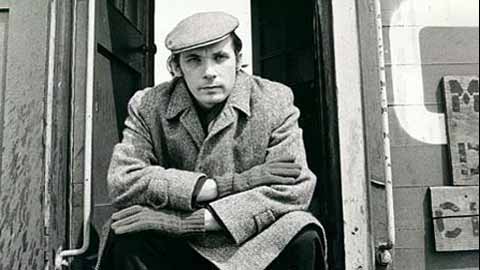
One of the certain effects of the electronic age is that it will forever change the values that we attach to art. In fact, the vocabulary of aesthetic criteria that has been developed since the Renaissance is mostly concerned with terms that are proving to have little validity for the examination of electronic culture. I refer to such terms as "imitation," "invention," and, above all, "originality," which in recent times have implicitly conveyed varying degrees of approval or censure, in accordance with the peculiarly distorted sense of historical progression that our age has accepted, but which are no longer capable of conveying the precise analytical concepts they once represented.
Electronic transmission has already inspired a new concept of multiple-authorship responsibility in which the specific concepts of the composer, the performer, and, indeed, the consumer overlap. ...It will not, it seems to me, be very much longer before a more self-assertive streak is detected in the listeners participation, before, to give but one example, "do-it-yourself" tape editing is the prerogative of every reasonably conscientious consumer of recorded music (the Hausmusik activity of the future, perhaps!). And I would be most surprised if the consumer involvement were to terminate at that level. In fact, implicit in electronic culture is an acceptance of the idea of multilevel participation in the creative process.
-- From "Strauss and the Electronic Future," 1964
Robert Green in 1592 attacked a "provocative" new rival, a "mere player who considers himself to be the only shake-scene in the country," and who thinks that he can "bombast out blank verse" in the manner of university-trained playwrights.
Quoting from Green's critique of Shakespeare, Thomas Pettitt refers to him as "merely an upstart crow beautified with our feathers." Pettitt was making the point that just as his students have something in common with Shakespeare, he has something in common with Green, which is that they are both speaking from within what he calls the "Gutenberg Parenthesis."
The urgency
SOCRATES: But there is something yet to be said of propriety and impropriety of writing.
... The specific which you have discovered is an aid not to memory, but to reminiscence, and you give your disciples not truth, but only the semblance of truth; they will be hearers of many things and will have learned nothing; they will appear to be omniscient and will generally know nothing; they will be tiresome company, having the show of wisdom without the reality. -- Plato's Phaedrus
Costs of the existing model
- We've seen dramatic shifts in music, book and newspaper publishing, and major upheaval in TV and filmmaking. "Broadband eats everything."
- Link by Link - Don't Buy That Textbook, Download It Free: "This market is not working very well — except for the shareholders in the textbook publishers," he said. "We have lots of knowledge, but we are not getting it out."
- Flat World Knowledge - See this breakdown from Chris Anderson's book
- Let's think about Wikipedia (again) in comparison to Britannica, about YouTube (or Ted Talks), about the flood of open educational materials being released into the world, fledgling freelance professors, and learning parties.
"When copies are super abundant, they become worthless."
"When copies are super abundant, stuff which can't be copied becomes scarce and valuable." -- Kevin Kelly, Better than Free -- Maybe it's the artifact? Maybe it's an experience?
"Embracing the social means embracing the abundant - and emphasizing instead the way an organization might actually help people on the periphery generate value for themselves." -- Douglas Rushkoff, Real social
|
|


